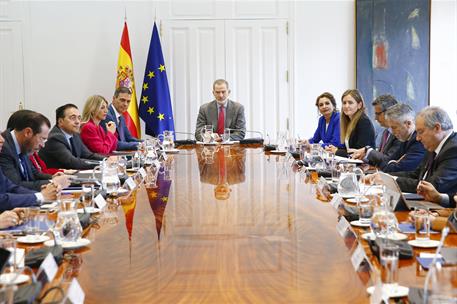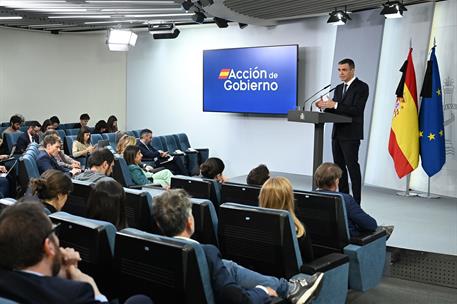Appearance in the Lower House of Parliament
Pedro Sánchez, on the causes of the electricity crisis: "They will be made public with full transparency, but the process will take time"
President's News - 2025.5.7
Lower House of Parliament, Madrid
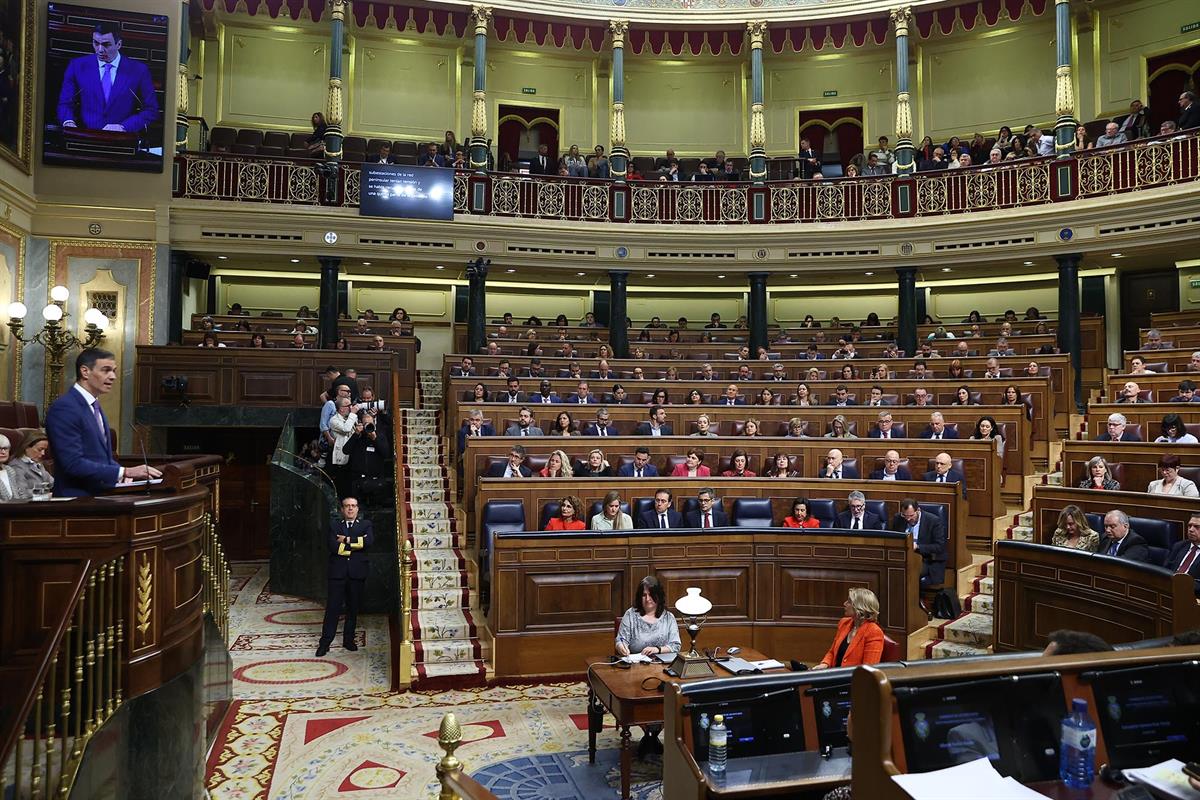 The President of the Government of Spain, Pedro Sánchez, during his appearance at his own request in the Lower House of Parliament to report on new security and defense needs and the energy crisis on April 28
The President of the Government of Spain, Pedro Sánchez, during his appearance at his own request in the Lower House of Parliament to report on new security and defense needs and the energy crisis on April 28
The President of the Government of Spain, Pedro Sánchez, defended in his appearance at his own request in the Lower House of Parliament the management of the Executive in the electricity crisis of 28 April, confirming that the Government will report "with total transparency" on the causes of the interruption of the electricity supply, which are currently being investigated in collaboration with all the actors involved in the electricity system.
"I can assure you that everything discovered will be made public. And with absolute transparency. But I must also tell you that the process will take time," said the president, who explained that some 756 million pieces of data, "the values generated by the 4,200 plants in the system between 12:15 and 12:35 on that day", will have to be examined "in detail".
Pedro Sánchez emphasised during his appearance the rapid recovery of the electricity supply - "the very proof of the strength of our system" - the proper functioning of essential public services, with workers who "were, once again, up to the task", and the civic behaviour of citizens: "Spain is an extraordinary country", he celebrated.
"We will get to the bottom of it"
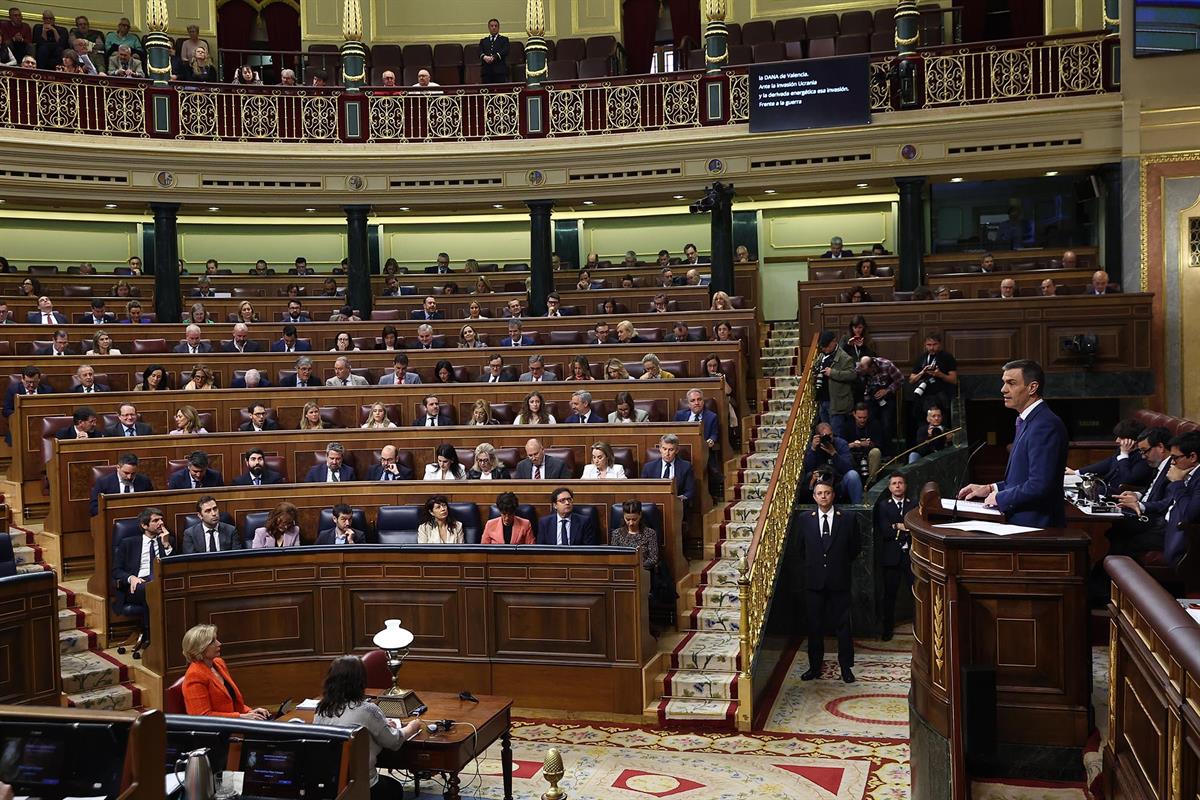 The President of the Government of Spain, Pedro Sánchez, during his appearance at his own request in the Lower House of Parliament to report on new security and defense needs and the energy crisis on April 28
The President of the Government of Spain, Pedro Sánchez, during his appearance at his own request in the Lower House of Parliament to report on new security and defense needs and the energy crisis on April 28
During his appearance at his own request in the Hemicycle, the president detailed what happened on the morning of Monday 28 April, and explained the actions taken by the Executive since then. "On Tuesday 29th, the Government asked Red Eléctrica and the other energy companies to carry out an exhaustive examination of their telemetry, the results of which we are already receiving and analysing".
At the same time, he continued, a technical analysis committee was set up, led by the Third Vice-president and Minister for Ecological Transition and Demographic Challenge, Sara Aagesen, with the participation of several competent bodies, and consisting of two working groups focused on cybersecurity and the examination of the operation from an electrical point of view.
The Government has also asked the European Electricity Coordination Group, which reports to the European Commission and the independent regulators, to prepare an independent report from Brussels, and the National Court has opened a case to investigate the origin of the blackout and to determine who is responsible.
On this point, Pedro Sánchez called for prudence: "We are not going to draw superficial or self-serving conclusions. What we are going to do is get to the heart of the matter because we want to assume and demand these political responsibilities and, above all, because we want to use this experience to improve and make our electricity system even more reliable than it is today", he said.
Towards a new energy model
The president firmly denied that what happened on the 28th April was related to the use of renewable energies or the shortage of nuclear power plants: "To date, there is no empirical evidence to tell us that the incident was caused by an excess of renewables or a lack of nuclear power plants in Spain," said Pedro Sánchez, who described this possible link as a "gigantic manipulation".
In this context, the chief executive confirmed that not one company has formally requested an extension to delay the closure of nuclear plants beyond the timetable agreed by the energy companies themselves in 2019, stressing that the future of energy in Spain lies in other sources such as hydropower, solar, wind and green hydrogen.
"We will not deviate a single millimetre from the planned energy roadmap drawn up in 2018. Renewables are not just the future, they are our only option. They are the only way to reindustrialise Spain", argued President Sánchez in his defence of the energy model the Government has been promoting since 2018. "Spain's energy future will be green or there will be no future".
Security and Defence Plan: objectives and commitments
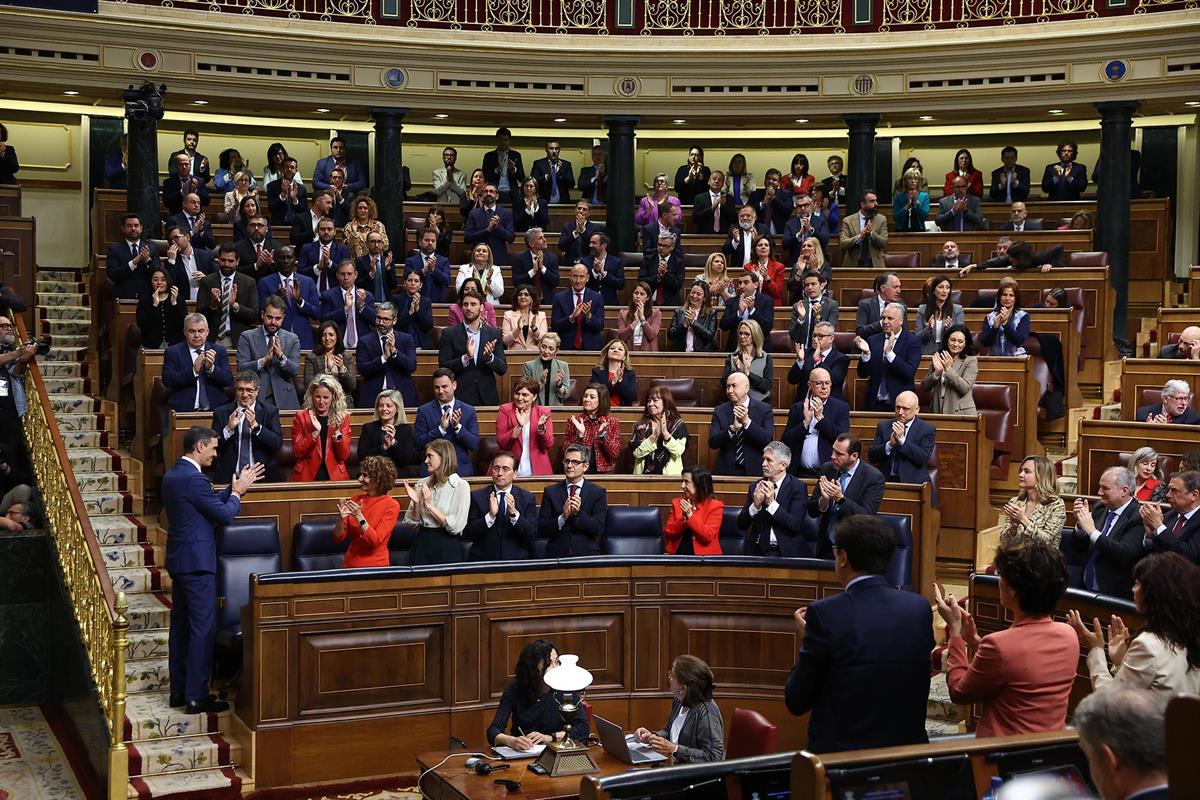 The President of the Government of Spain, Pedro Sánchez, during his appearance at his own request in the Lower House of Parliament to report on new security and defense needs and the energy crisis on April 28
The President of the Government of Spain, Pedro Sánchez, during his appearance at his own request in the Lower House of Parliament to report on new security and defense needs and the energy crisis on April 28
In the second part of his appearance, Pedro Sánchez once again detailed the objectives and commitments included in the Industrial and Technological Plan for Security and Defence, which he presented after the Council of Ministers held on 22 April.
The president recalled that with this strategy, which will increase investment in security and defence by over €10.47 billion, the Government will fulfil its commitment to reach the 2% of GDP acquired in 2014 by addressing three central issues: guaranteeing Spain's security in the new geopolitical context; consolidating the country as a central member of the EU and NATO, and promoting a new wave of innovation and reindustrialisation.
To achieve these objectives, the plan includes five items that will be allocated to improving the working conditions, preparation and training of the Armed Forces, as well as their capabilities in emergency management and conditions in peace missions; the acquisition of new telecommunications and cybersecurity capabilities, and the modernisation of defence and deterrence capabilities.
The chief executive also insisted that the promotion of this plan will not mean any reduction in the welfare state: "We are going to finance it without touching a cent of social spending or environmental policy, without raising taxes, and without incurring more public debt", concluded Pedro Sánchez, who also stressed that according to the Government's forecasts, the measures proposed will contribute to increasing GDP by between 0.4 and 0.7 percentage points, and will generate more than 36,000 direct jobs.
Non official translation






